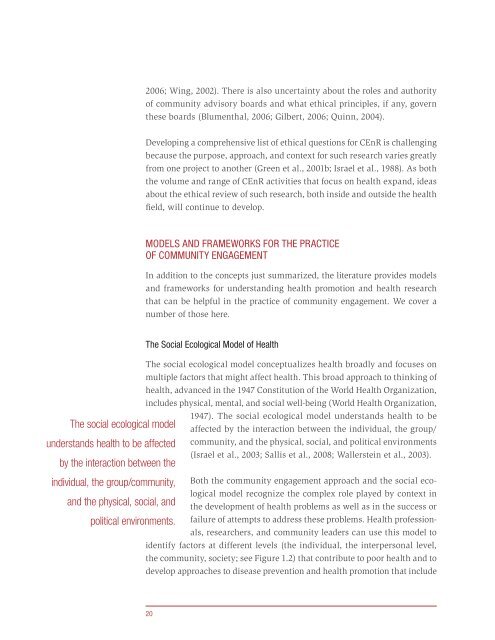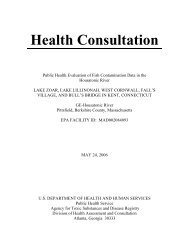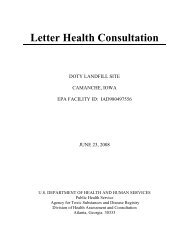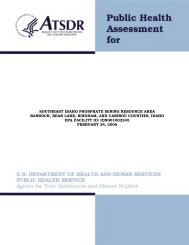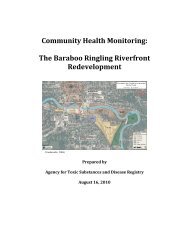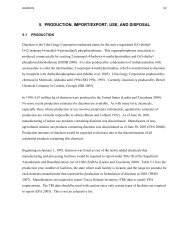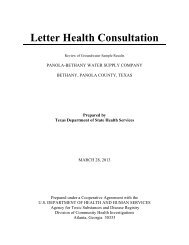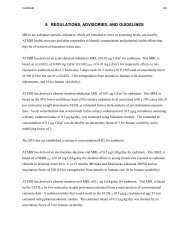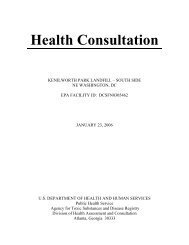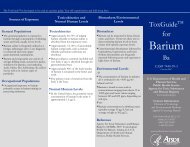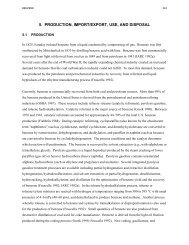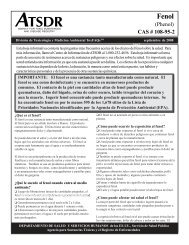Principles of Community Engagement (Second Edition)
Principles of Community Engagement (Second Edition)
Principles of Community Engagement (Second Edition)
You also want an ePaper? Increase the reach of your titles
YUMPU automatically turns print PDFs into web optimized ePapers that Google loves.
The social ecological model<br />
understands health to be affected<br />
by the interaction between the<br />
individual, the group/community,<br />
and the physical, social, and<br />
political environments.<br />
2006; Wing, 2002) There is also uncertainty about the roles and authority<br />
<strong>of</strong> community advisory boards and what ethical principles, if any, govern<br />
these boards (Blumenthal, 2006; Gilbert, 2006; Quinn, 2004)<br />
Developing a comprehensive list <strong>of</strong> ethical questions for CEnR is challenging<br />
because the purpose, approach, and context for such research varies greatly<br />
from one project to another (Green et al , 2001b; Israel et al , 1988) As both<br />
the volume and range <strong>of</strong> CEnR activities that focus on health expand, ideas<br />
about the ethical review <strong>of</strong> such research, both inside and outside the health<br />
field, will continue to develop<br />
MODELS AND FRAMEWORKS FOR THE PRACTICE<br />
OF COMMUNITY ENGAGEMENT<br />
In addition to the concepts just summarized, the literature provides models<br />
and frameworks for understanding health promotion and health research<br />
that can be helpful in the practice <strong>of</strong> community engagement We cover a<br />
number <strong>of</strong> those here<br />
The Social Ecological Model <strong>of</strong> Health<br />
The social ecological model conceptualizes health broadly and focuses on<br />
multiple factors that might affect health This broad approach to thinking <strong>of</strong><br />
health, advanced in the 1947 Constitution <strong>of</strong> the World Health Organization,<br />
includes physical, mental, and social well-being (World Health Organization,<br />
1947) The social ecological model understands health to be<br />
affected by the interaction between the individual, the group/<br />
community, and the physical, social, and political environments<br />
(Israel et al , 2003; Sallis et al , 2008; Wallerstein et al , 2003)<br />
Both the community engagement approach and the social ecological<br />
model recognize the complex role played by context in<br />
the development <strong>of</strong> health problems as well as in the success or<br />
failure <strong>of</strong> attempts to address these problems Health pr<strong>of</strong>essionals,<br />
researchers, and community leaders can use this model to<br />
identify factors at different levels (the individual, the interpersonal level,<br />
the community, society; see Figure 1 2) that contribute to poor health and to<br />
develop approaches to disease prevention and health promotion that include<br />
20


